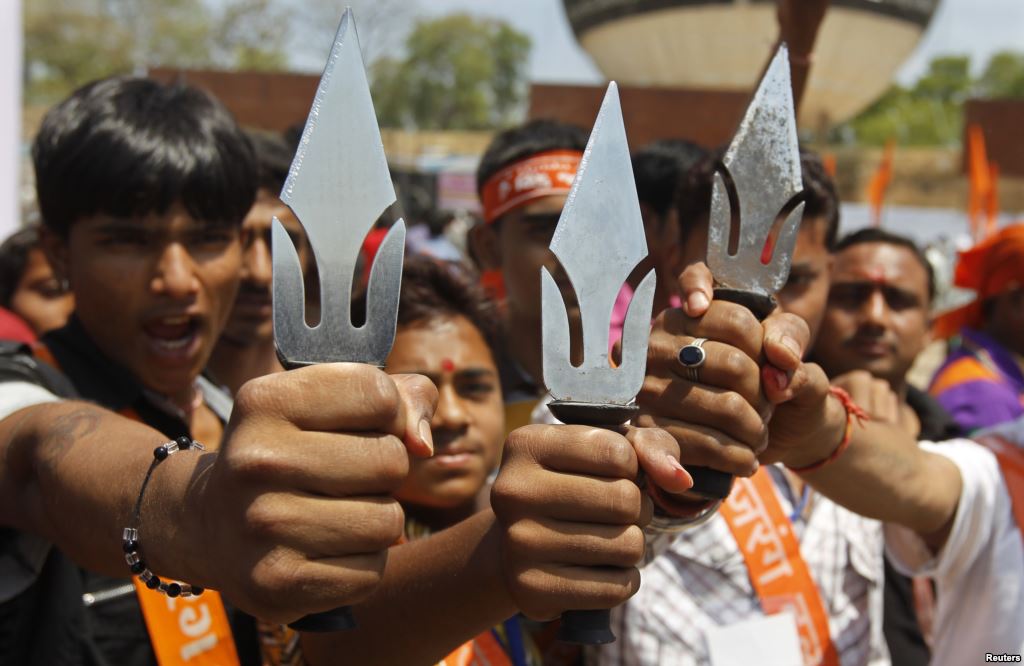A peek into the Hindutva Rashtra of Central Bharat

The terrorising attack on a pastor and his wife who were doused with fuel oil in Chhattisgarh, followed by the stopping of a church wedding in Madhya Pradesh, within weeks of each other in April speak of the immunity that Sangh Parivar cadres enjoy in these two sibling states. Both states have been under Bharatiya Janata Party(BJP) rule – with both Mr. Shivraj Chauhan and Dr. Raman Singh as chief ministers now well into their third five year terms, but the advent of the party in the Union government has given a new edge to the aggression against religious minorities in the small towns and villages of this central Indian region.
The region was hostile to the Christian community, and specially its clergy, even when the Congress was in power. It was under the then chief minister Mr. Ravi Shankar Shukla of the Central Provinces, as it was then known, that set up the notorious Justice Niyogi Commission in 1956, which is now a handbook for the Sangh Parivar in targetting churches, institutions and pastors. Madhya Pradesh was also among the first states to also enact the so-called Freedom of Religion Acts, which have been indicted by UN Special Rapporteurs as violating international freedom of religion covenants.
While Madhya Pradesh remains a state causing great concern for the hostility against the Christian minority, it is Chhattisgarh that has emerged as the next worst in line, now topping the list of regions where the Christian community in India, is persecuted. There were four cases in the first three months of 2016, before the latest incident.
In 2015, Chhattisgarh recorded 20 cases, third highest after Madhya Pradesh with 36 cases, Uttar Pradesh with 22 cases, according to Reverend Vijayesh Lal, Executive Director of the Evangelical Fellowship of India who publishes the annual report persecution in the country, the main report on Freedom of Religion from the perspective of the Christian community.
In the latest case reported from Karanji village in the Tokapal area of the Bastar district in the state, Pastor Dinbanhu Sameli, 30, and his wife, Meena, 26, who is seven months pregnant, were assaulted and their church set on fire on Sunday, April 17, after they refused the mob’s demand that they shout Jai Shri Ram.
Witnesses told reporters that two young men approached the pastor outside his home next to his church at around 7 pm, initially asking for prayer, claiming they were from a nearby Methodist church. But they later brought out a sword which they held to the pastor’s neck, and demanded the couple shout “Jai Shri Ram” and kick a copy of the Bible. The couple did not obey. The two men threw petrol on the couple and on their small church and set it ablaze. The young couple broke free and ran away before the flames could reach them.
According to the couple, last year a Bajrang Dal group came on two tractors, shouted “Jai Shri Ram” in front of the church, and wrote the same slogan on both the sides of the main door.
Alliance Defending Freedom, a law and legal assistance group headquartered in the national capital, has in 2014 successfully challenged anti-Christian resolutions passed by several village councils which had banned “non-Hindu” religious activities in their territories, effectively criminalising the presence or entry of evangelists and pastors, and prayers in house churches.
The region was hostile to the Christian community, and specially its clergy, even when the Congress was in power. It was under the then chief minister Mr. Ravi Shankar Shukla of the Central Provinces, as it was then known, that set up the notorious Justice Niyogi Commission in 1956
Not that the government and its agencies do not target Christians whenever possible, despite the assurances given by the chief minister when delegations meet him to apprise him of the latest incident. In one such particularly blatant case, a church in Raipur was vandalised during a Sunday worship in March this year. A protest was sent to the government. Ten days later, on March 17, the Municipal Corporation gave a demolition notice to a Pentecostal church alleging had been built illegally and was an encroachment on land to which it had no right. The Chhatisgarh Christian groups collected over a thousand Christians for a sit-in protest, forcing the government to withdraw the order.
In February, a pastor was beaten during a prayer meeting, while two months earlier a group of activists from Bajrang Dal demolished a new church in Korba.
In neighbouring Madhya Pradesh, which has topped the list of anti-Christian violence two years in a row now, the latest incident is of Bajrang Dal members bringing the police with them to stop church wedding in Satna alleging that the bride and the groom had been unlawfully converted to Christianity. As the Indian Express reported, the Kolgawan police constables entered the Church of God in India and arrested 10 people, including pastor Sam Samuel and the groom’s parents. CSP (Satna) Sitaram Yadav alleged that the bride was a minor as she was 10 days short of turning 18. Satna SP Mithilesh Shukla also agreed with Bajrang Dal claiming that the girl was “Hindu.” The groom, 24-year-old Ajay Kushwaha, works with a private firm. Besides Sections 3 and 4 of the Madhya Pradesh Freedom of Religion Act, police have invoked IPC Section 295 (A) (deliberate and malicious act intended to outrage religious feelings) and Section 14 of the Prohibition of Child Marriage Act.
Mr. Mariyosh Joseph, speaking on behalf of the church congregation, denied the charges rubbishing them as false. He said the bride and groom were Christians adding that the Bajrang Dal and the RSS were behind the complaint.
(The author is a journalist, occasional documentary film maker and social activist)
See also
1. Diversity Threatened: 177 Cases of Violence against Christians in 2015
2. Dialogue with the deaf?